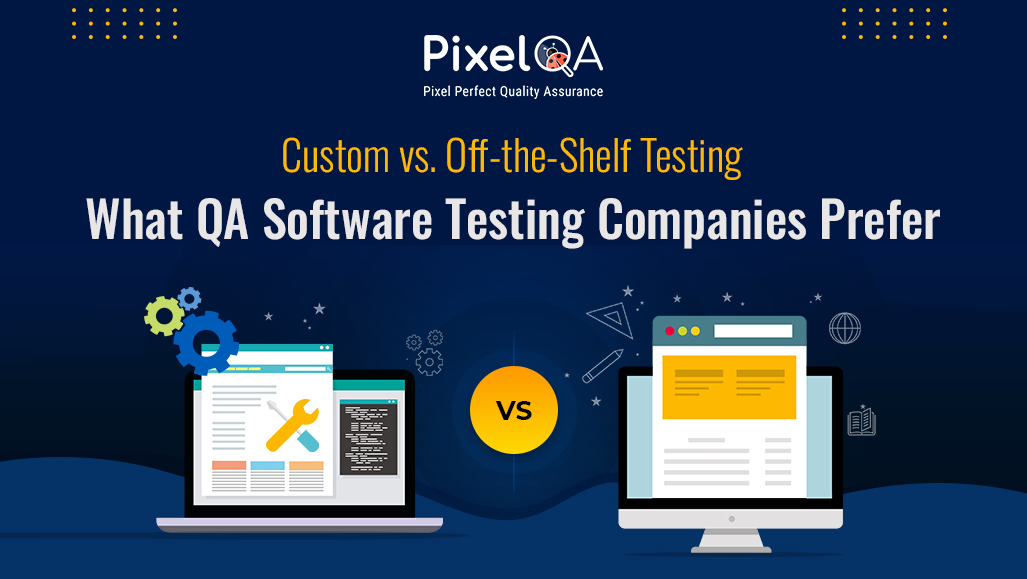
Far too many organizations make the hard discovery far too late: their testing strategy is a misfit for their particular requirements. The repercussions are dire, such as lost market opportunities, unsustainable maintenance budgets, irate customers, and lost revenue. Usually, the cause of this inefficiency is not the absence of energy, but a strategic mistake in principle: the selection between a bespoke testing framework and a commercially available, off-the-shelf tool.
Business executives frequently wonder: Do we spend money on a flexible, customized testing platform or use established tools that guarantee speed and ease? The choice isn't to be taken lightly. It determines product quality, operational effectiveness, and scalability over time. Let's deconstruct the main differences and find out what most quality assurance (QA) software testing firms advise.
Understanding the Two Approaches
Off-the-Shelf Testing Solutions
Off-the-shelf test tools are pre-configured frameworks and bundles of software that can be used instantly. Popular ones such as Selenium, JUnit, or commercial suites like TestComplete and UFT qualify in this category. They are meant to solve a broad spectrum of testing requirements without heavy customization.
Advantages:
- Quick setup and faster time to testing
- Lower upfront costs compared to custom-built frameworks
- Community support and regular updates from vendors
- Best suited for common, recurring testing scenarios
Limitations:
- Limited flexibility for unique workflows or domain-specific requirements
- Higher ongoing licensing costs (for proprietary solutions)
- Risk of tool fatigue if teams adopt multiple, disconnected solutions
- May not integrate seamlessly with all enterprise systems
Custom Testing Frameworks
Custom testing entails the construction of frameworks or modifying an available open-source toolset so that it meets the specific needs of a project or business. QA vendors configure these solutions according to the product's architecture, workflows, and scalability over time.
Advantages:
- Highly flexible and scalable for complex, evolving products
- Seamless integration with CI/CD pipelines and custom environments
- Greater control over features, extensibility, and reporting
- No long-term licensing costs if built on open-source foundations
Limitations:
- Longer time-to-deploy compared to plug-and-play tools
- Higher upfront investment in design and development
- Requires skilled QA engineers who can maintain and evolve the framework
What QA Software Testing Companies Actually Prefer
QA companies these days don't just use the same old method for every project. They check out what's needed for each one, like how hard it is, how much money there is, when it needs to be done, and what the client wants to achieve in the future. Here’s what the best testing companies usually suggest:
For Startups and Fast-Moving Teams
Off-the-shelf tools are optimal when speed is the priority. For firms releasing a minimum viable product (MVP) or piloting small applications, time-to-market may well trump full customization. QA vendors typically advise commercial or open-source off-the-shelf suites to lower barriers to testing.
For Enterprises and Regulated Industries
Finance, healthcare, and aviation industries have strict compliance needs, heavy data protection, and extensive software lifecycles. In such cases, bespoke frameworks are likely to take the win. QA providers prefer developing custom testing environments so that they can ensure accuracy, scalability, and rigorous governance.
For Growing Digital Enterprises
Companies growing from simple testing to continuous testing patterns typically find advantage in a hybrid method. QA partners create a proprietary framework with trusted off-the-shelf tools, providing flexibility as well as velocity. For example, utilizing Selenium for test automation, but adding customized reporting dashboards or custom integration layers.
Factors That Influence the Decision
When helping businesses choose between custom and off-the-shelf solutions, QA companies typically evaluate:
Project Complexity
- Complex applications with multi-layered architecture require custom frameworks.
- Simple mobile apps or websites can rely on off-the-shelf solutions for efficiency.
Time-to-Market Pressures
- If launching fast is the top priority, ready-made tools often make more sense.
Long-Term Cost of Ownership
- Off-the-shelf solutions may seem cheaper initially, but can accumulate licensing and integration costs over time.
- Custom solutions require upfront investment but offer reduced costs over the long run.
Scalability Needs
- Businesses expecting rapid scaling or integration into DevOps pipelines often receive QA company guidance to lean toward custom frameworks.
Security and Compliance
- Regulated industries lean heavily toward custom frameworks, where control and compliance features can be baked into the testing design.
Practical Benefits for Business Leaders
When considering testing approaches with QA vendors, business decision-makers ought to look for the hard business value, rather than technical advantages and disadvantages:
- Less Chance of System Breakdowns: Personalized frameworks reduce edge-case breakdowns that generic tools may overlook.
- Better Return on Investment: Matching the testing methodology to product complexity avoids unnecessary spending on excess solutions.
- Accelerated Releases: The correct selection allows for faster regression testing, speeding up innovation without degrading quality.
- Competitive Advantage: Businesses with strong, well-fitting testing strategies ship more consistent products and eventually establish greater customer trust.
The Conclusion
The argument between custom and off-the-shelf testing solutions is not one of "which is better." It's one of which is more suited to your specific business environment. Startups require speed, enterprises require precision, growing organizations require both. It's most important to find a QA software testing organization that does not impose a one-size-fits-all approach but instead takes the time to learn about your product, market, and growth path. By coordinating the testing strategy with your business plan, you minimize expense and risk as well as set your company up for long-term digital success.
If inefficiencies in software testing are currently plaguing your organization, now's the time to take stock of whether your frameworks and tools are truly optimizing for your goals. The proper testing solution is not only a technical decision, it's a strategic one for your company's future.

